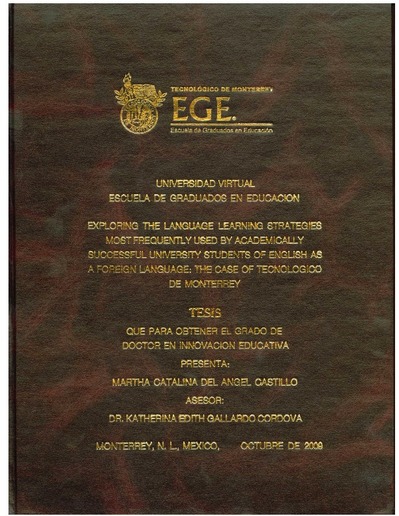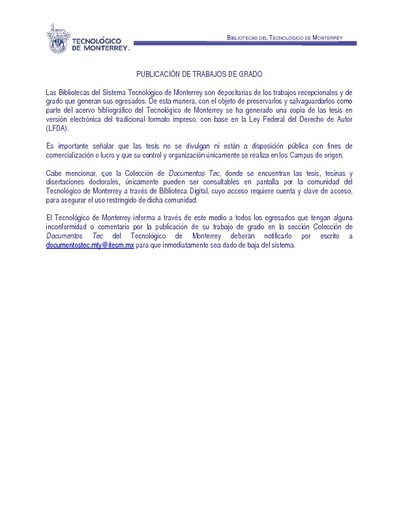Mostrar el registro sencillo del ítem
Exploring the Language Learning Strategies most Frecuently Used by Academically Successful University Students of English as a Foreign Language: The Case of Tecnológico de Monterrey -Edición Única
| dc.contributor.advisor | Dra. Katherina Edith Gallardo Córdova | en |
| dc.creator | del ángel Castillo, Martha C. | en |
| dc.date.accessioned | 2015-08-17T11:34:52Z | en |
| dc.date.available | 2015-08-17T11:34:52Z | en |
| dc.date.issued | 2009-10-01 | |
| dc.identifier.uri | http://hdl.handle.net/11285/572544 | en |
| dc.description.abstract | English language teaching and learning has been the concern of universities because students should be able to use the language both in informal and academic settings in order to become competitive in their professional field. The main objective of this dissertation is to explore the language learning strategies most frequently used by academically successful students in higher education. As language learning strategies is a field that needs to be deeply explored, Mixed Method Design was selected. This study was performed in three phases: (i) The quantitative phase describes the results found after analyzing a population formed by 1,283 higher education students registered in the January-May 2009 period. A general questionnaire and The Strategy Inventory for Language Learning designed by Oxford (1990) were applied. (ii) The qualitative phase describes how a sample was selected as a result of phase I and how the interviews were held with selected participants. (iii) The interpretation phase combines the previous stages in order to get integrated results from phases I and II. The results revealed that academically successful students use Metacognitive Strategies more frequently. They share their problems with their parents, participate in extra-curricular activities, find ways to solve difficulties on their own, propose themselves as leaders for assignments or teamwork, do some self-study, ask for help to overeóme limitations, do their assignments completely and on time. Thus, this study demonstrated that language learning strategies along with other personal and family complements lead students to reach academic success. | |
| dc.language | eng | |
| dc.publisher | Instituto Tecnológico y de Estudios Superiores de Monterrey | |
| dc.rights | info:eu-repo/semantics/openAccess | |
| dc.rights.uri | http://creativecommons.org/licenses/by-nc-nd/4.0 | * |
| dc.title | Exploring the Language Learning Strategies most Frecuently Used by Academically Successful University Students of English as a Foreign Language: The Case of Tecnológico de Monterrey -Edición Única | en |
| dc.type | Tesis de doctorado | |
| thesis.degree.level | Doctora en Innovación Educativa | en |
| dc.contributor.committeemember | Dr. Eduardo Flores Kastanis | es |
| dc.contributor.committeemember | Dr. Armando Lozano Rodríguez | es |
| thesis.degree.discipline | Escuela de Graduados en Educación | en |
| thesis.degree.name | Doctorado en Innovación y Tecnología Educativas | en |
| dc.subject.keyword | Exploring Language Learning Strategies | en |
| dc.subject.keyword | English as a Foreign Language | en |
| dc.subject.keyword | Academic Success | en |
| dc.subject.keyword | University Students | en |
| thesis.degree.program | Campus Monterrey | en |
| dc.subject.discipline | Ciencias Sociales / Social Sciences | en |
| refterms.dateFOA | 2018-03-17T03:51:20Z | |
| refterms.dateFOA | 2018-03-17T03:51:20Z | |
| html.description.abstract | English language teaching and learning has been the concern of universities because students should be able to use the language both in informal and academic settings in order to become competitive in their professional field. The main objective of this dissertation is to explore the language learning strategies most frequently used by academically successful students in higher education. As language learning strategies is a field that needs to be deeply explored, Mixed Method Design was selected. This study was performed in three phases: (i) The quantitative phase describes the results found after analyzing a population formed by 1,283 higher education students registered in the January-May 2009 period. A general questionnaire and The Strategy Inventory for Language Learning designed by Oxford (1990) were applied. (ii) The qualitative phase describes how a sample was selected as a result of phase I and how the interviews were held with selected participants. (iii) The interpretation phase combines the previous stages in order to get integrated results from phases I and II. The results revealed that academically successful students use Metacognitive Strategies more frequently. They share their problems with their parents, participate in extra-curricular activities, find ways to solve difficulties on their own, propose themselves as leaders for assignments or teamwork, do some self-study, ask for help to overeóme limitations, do their assignments completely and on time. Thus, this study demonstrated that language learning strategies along with other personal and family complements lead students to reach academic success. |
Ficheros en el ítem
Este ítem aparece en la(s) siguiente(s) colección(ones)
-
Ciencias Sociales 565
Gobierno y Transformación Pública / Humanidades y Educación / Negocios / Arquitectura y Diseño / EGADE Business School


